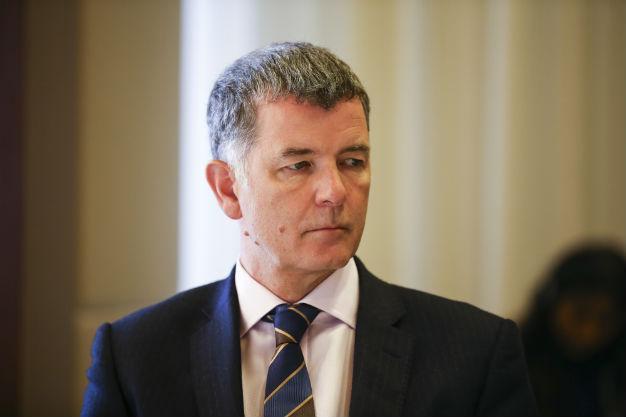UK ambassador to Turkey deals with conspiracy theories through humor
Emine Kart - ANKARA

AA photo
Turkish society’s fondness for conspiracy theories has prompted U.K. Ambassador to Turkey Richard Moore to resort to his nation’s famous sense of dry humor while congratulating Beşiktaş on its recent Super League triumph.
Moore, known to be a big fan of the Black Eagles, was at the club’s new stadium in Istanbul on May 15 to watch Beşiktaş claim its first Turkish league title in seven years and its 14th ever, with a 3-1 win over Osmanlıspor.
During the match, Moore retweeted messages posted on Beşiktaş’s official Twitter account. Upon his return to Ankara on the morning of May 16, he flew the Beşiktaş flag at his official residence and posed for a photo with the flag.
“#Besiktas supporter .@UKAmbRichard serves in Turkey 1990, 91, 92, 2014, 15 and 16. @Besiktas wins championship 1990, 91, 92, 2016! 4 out of 6… Just saying!” Moore then wrote on his official Twitter account.
As he often does, Moore – who is fluent in Turkish - also posted a Turkish message with the same theme. Repeating the first part of the message in Turkish, he, then added: “4 out of 6… Isn’t it noteworthy? Is this a coincidence too!?”
In Turkish political and media jargon, the phrase “noteworthy coincidence” is often used to hint at alternative causes for outrageous coincidences.
“I was teasing, as my Twitter account does seem to attract comments from a lot of people who believe in conspiracy theories,” Moore told the Hürriyet Daily News on May 17 when asked about his tweets.
On May 15, he responded he responded to a follower who asked him “@UKAmbRichard how come the [outlawed Kurdistan Workers’ Party] PKK got their hands on NATO inventory weapons if there are no external forces involved in the problem?”
“I am sure they weren’t ‘NATO inventory’. Sadly weapons are all too available. No terrorist group even ran out of weapons,” Moore responded.
On Sept. 6, 2015, when a follower referred to King Edward VIII’s visit to Istanbul in 1936 when he met with Mustafa Kemal Atatürk, the founder of the Republic of Turkey, Moore said: “And we’ve never looked back since, despite the sillier conspiracy theories that still circulate!”
‘Turkey hasn’t forgotten WWI’
According to Anne Bostanci, co-author of the recent British Council report, “Remember the World as well as the War,” Turkey is still dealing with the memory of the First World War.
“While the war ended for some countries in 1918-19, it did not end for Turkey. The First World War led straight into the Turkish War of Independence [1919-1923]. This, together with the secret wartime agreements between the British and the French to divide up Ottoman territory among themselves, sealed the fall of this formerly formidable empire, and led to the creation of the Turkish Republic - reduced primarily to the former empire’s Anatolian heartland - under Mustafa Kemal Atatürk,” Bostanci wrote in a 2014 article in the British Council’s “Voices” magazine.
“Turkish collective memory of this period is colored by these events. It lost its status amongst the great empires and, with it to some extent, its role in Europe. And it felt betrayed by the British who had, during the war, formed secret alliances with Ottoman Arabs to stir up revolts against their Turkish imperial rulers and entered into the secret Sykes-Picot Agreement in 1916 with the French, to take control of much of the empire’s former territory. It is therefore no surprise that British individuals and organizations operating in Turkey, such as the British Council, sometimes encounter a degree of mistrust or resentment,” Bostanci added.
